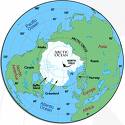Behind the Talks: US-NATO Prepare Confrontation in the Arctic

Moscow regards as inadmissible the prospects for a military presence in the Arctic region. It’s no secret at all that in recent years quite a number of states in the West, including the USA, have unveiled their plans to build at least 66 warships to be used for conducting hostilities in the Arctic region.
Competition in the Arctic region is becoming more and more intense. At the conference of the five Arctic coastal states in Canada, the U.S. Secretary of State Hillary Clinton has said that it is necessary to defend the interests of the countries, which also have their lawful interests in the Arctic Ocean. Mrs Clinton was speaking about Sweden, Finland and Iceland.
Representatives of these states were not invited to take part in the conference, which means that the White House believes that it is highly probable that Russia will dominate the Arctic Region. It is rather doubtful that Washington’s position on this issue could be qualified as something new. The U.S. leadership has repeatedly told Moscow of its disapproval of Russian scientists’ work in the Arctic region.
However, there’re no grounds for such statements. Russia has the right to conduct work in its internationally-recognized 200-mile economic zone.
Moscow has strong arguments to believe that the underwater Lomonosov and Mendeleyev mountain ranges, stretching across the Arctic Ocean towards Greenland geologically, are the continuation of its continental shelf.
And according to the UN Convention on the Law of the Sea, coastal states have a sovereign right to exploration and development of natural resources on the shelf. But according to the Chairman of the Duma Committee on Ecology Vladimir Grachev, primarily it is necessary to speak about scientific work, which is of great importance for the whole world.
It is necessary to deeply and scientifically study all the existing problems. And in this aspect, Russia’s initiative to study the Arctic region and the work its drifting station is doing there is very important for the fulfillment of programs in the Arctic region.
Another issue, which is also very important, is the creation of a scientific programme on climate changes. Not everybody understands today that climate changes will influence considerably the Arctic Region. And all these climate changes can lead not only to a substantial global change in the climate but also to global changes in the life of the northern territories.
For his part, Russia’s Foreign Minister Sergei Lavrov also rejected Washington’s claims. He says that all the five countries which have continental shelves of their own should resolve thorny issues exclusively on the basis of the UN Convention on the Law of the Sea.
Moscow has never violated this document. The information Russian scientists have collected must provide sufficient grounds for Russia’s claims to considerable parts of the Arctic shelf. As for scientific cooperation in the Arctic region, Russia has always stood for consolidated effort in this sphere, including the necessity to carry out profound studies of the condition of Arctic bio-resources and ecology. The point is that all the five coastal states conduct hydrographic research there, and the results of their work are in many respects mutually complementary.
Moscow also regards as inadmissible the prospects for a military presence in the Arctic region. It’s no secret at all that in recent years quite a number of states in the West, including the USA, have unveiled their plans to build at least 66 warships to be used for conducting hostilities in the Arctic region.
However, according to a special convention of the United Nations, which was signed by all the coastal states, the Arctic region should remain a demilitarized zone for ever.
Only scientific expeditions are admissible there, a fact many countries are trying to forget today. The point is that on the agenda today is the issue of 67 per cent of the potential reserves of the world’s hydrocarbons.
And Russia has no plans to yield here because it has the right to make its claims to the territory, 1.2 million square kilometers long, including the North Pole, the greater part of the Barents Sea water area, the Sea of Chukotsk, and also the Bering Sea. Moscow’s completed shelf bid will be ready by 2013.

